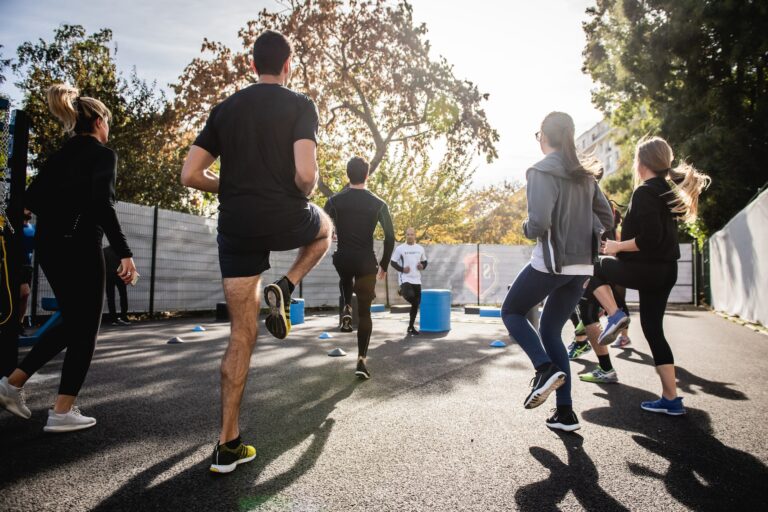Think of the last time you felt the adrenaline of a local marathon or the camaraderie at a community yoga session.
That’s the magic of health and fitness events. They’re not just about breaking a sweat; they’re about building bonds.
And there’s business to be had, too. Sports events are predicted to have a market volume of $37.16bn by 2027, so sports event management is one area worth looking into.
At Eventbrite, we do everything we can to support our community of event creators to build once-in-a-lifetime sports moments — whether it’s a sports event fundraiser, major cheerleading competition, medieval combat experience, yoga event, or a disc golf tournament.
Want to make waves in the sports scene? Dive into our guide on how to kickstart your unforgettable health or fitness event. Plus, we’ve sprinkled in some golden nuggets on event promotion to get you selling tickets immediately.
How to organize a sports event
2. Create a realistic budget and work out your event feasibility
4. Make sure your venue ticks all the boxes
5. Hire and train the right event staff
6. Secure the necessary equipment

Why host a sports events?
There’s a huge demand for sports events. 70% of Americans identify as sports fans, while 83% say they regularly watch sports teams play to socialize with friends and family.
Apart from their popularity, according to researchers, attending live sports events reduces loneliness and improves overall quality of life.
So, it shouldn’t surprise you to know that sports events can be lucrative opportunities for event creators. Affluent families spent $20bn on sports events last year, and these events can double up as effective promotional tools for showcasing your business to your local community.
That’s how Jiaren Yoga Studio got its name out there. By hosting inclusive and entry-level yoga events for anyone to try, the studio has earned brand recognition, spread its core message, and since created more successful events.
Successful sports events aren’t all about boosting your business, though. Organizing a fitness event can also serve as a charity fundraiser that allows you to give back to your community. For example, charity Caleb’s Kids organizes an annual 5k fundraiser for Suicide Awareness and Prevention Month.
How to organize a sports event
A successful sports event requires a holistic event planning process. Let’s dive into the key steps you’ll need to organize and execute your sports event.
1. Define your event’s purpose
Determine why you’re hosting a sports event. Is the purpose of the event to promote your business, gain new customers, fundraise, or engage the community? Your event set-up and goals will change depending on your objectives. If you’re trying to engage the community, you’re likely to offer different activities than if you’re working on brand awareness.
Need some inspiration? Take a look at Chicago-based event creator Deep House Yoga.
Creator Alissa Seymoure started organizing her own yoga events because she was struggling to connect with the music and ambiance in the yoga classes she attended. By combining yoga with her love of DJing and house music, she managed to create a whole different kind of yoga experience — and we’re totally here for it.
💡Pro tip: When defining your purpose, make sure the “why” behind your event is something that’ll resonate with your target audience.
2. Create a realistic budget and work out your event feasibility
You’ll need to determine your budget and plan the costs, or plan accordingly if you’re looking for sponsors to support a charity sports event. Your typical budget will include line expenses like:
- Venue rental (or if you’re a venue owner, utilities and running costs)
- Event staff
- Parking
- Food catering
- Event insurance
- League fees
- Medical/emergency services
- Merchandise
If you’re planning a virtual or hybrid event, you’ll also need to budget for an event management platform and equipment and staff for live streaming.
💡Pro tip: With 59% of people considering cost as one of the main factors influencing sports event attendance, hiking up ticket prices may not be the best way to increase your budget. Instead, consider reducing the registration and ticket fees but increasing the opportunities for attendants to purchase extras like food, drink, or merch.
3. Create a sports event plan
Your sports event plan should be ready to distribute before you meet with your staff and event volunteers before the event.
Follow a sports event planning template as your go-to guide on all the details of your event. It should include:
- Weekly goals to prepare for your event: List specific tasks to accomplish each week leading up to your event. Assign tasks to your team of volunteers and set a deadline for each job.
- Budget breakdown: Create your budget and categories to keep track of event spending to ensure you stay on track.
- Event day plan: Include a minute-by-minute schedule for the event. Your event management plan should list timelines for setup, the event itself, and cleanup.
💡Pro tip: You should also create checklists to cover the different areas you need to focus on before, during, and after the event to ensure your events team is always on the ball.

4. Make sure your venue ticks all the boxes
Once you have a date, it’s time to find a winning venue or make your existing event space competition-ready.
Will you need seating for spectators or open space for games? Consider any amenities you may need, including concession stands and restrooms.
Venue owners with access to a competition space need to make sure the existing facilities and infrastructure they have in place will fully support the scope of the sports event they’re planning.
That means locker rooms, parking spaces for spectators and medical staff, catering, toilets, and anything specific to your particular sport or type of event.
💡Pro tip: When shopping around for a venue (or getting yours ready for an upcoming event), ensure all the correct permits are in place. Check you’re also covered by insurance in case anyone is injured at the event.

5. Hire and train the right event staff
Think about whether you’ll hire a team or recruit volunteers.
If you’re planning an outdoor, large-scale event, you’ll need to have enough help to work registration tables, concession stands, and information booths. Other volunteers can help with setting up or cleaning up your event.
You might even need additional staff to help with traffic flow, crowd control, and parking.
Even if you’re planning a smaller community event, you’ll likely need access to a few extra pairs of hands with specialist knowledge to help run your event.
For example, if you require a referee, check with local high school athletic departments and sports clubs.
💡Pro tip: A proactive communication plan helps you keep your team in the loop. Before event day, distribute information on parking, directions, schedules, food and drink options, and more. You should ideally send this information out one to two weeks beforehand to keep them focused and in the loop.

6. Secure the necessary equipment
Your sports event planning will vary depending on the type of event, but you may want to invest in some merch such as T-shirts. Sports events may also require equipment like balls, rackets, bats, or cones. You might also want to purchase medals or trophies for the winners.
💡Pro tip: Don’t forget about refreshments! Special events like community races or charity fundraiser walks should have plenty of water stations set up for competitors and attendees alike. Meanwhile, soccer players could benefit from halftime snacks — and you could add to the experience of yoga participants with freshly brewed tea after a guided meditation session.
You could provide food as the event host by setting up a concession stand with snacks and drinks available for purchase, hire professional caterers, or even invite local food trucks to set up at your event.
7. Set up a contingency plan
Regardless of the size of your event, consider setting up a first aid tent to help with minor injuries, such as falls.
For larger fitness events, medical support can help with more serious concerns, such as dehydration or overheating.
Ask participants to sign a waiver before the event to protect you and your organization. You may also need to invest in liability insurance for additional legal protection for your business should a participant get injured.
💡Pro tip: Having an emergency action plan for a sporting event is essential. Your emergency action plan should include things like:
- A risk assessment identifying threats to your event
- An outline of the existing equipment you have to support your team in the event of an emergency
- Inclement weather plans
- Designated evacuation routes
Just remember there’s no one-size-fits-all approach around emergency action plans. Yours should be unique to your venue and event location.

4 ways to promote your sports event and build your following
Organizing a sports event can be incredibly fun and rewarding — but if you want to create a memorable experience, you need to get out there and promote it to your target audience.
Here are four top tips guaranteed to generate leads and pack the house.
1. Build excitement through targeted email campaigns
Email marketing is all about nurturing your leads — and when you’ve got future events lined up, it’s amazing to have a built-in audience waiting to hear about it.
Through event newsletters, you can engage your audience year-round. You can even incentivize signing up for your mailing list by sending exclusive offers, promo codes for discounted tickets, and unique content. This also helps you build a sense of community around your events.
Want to do email marketing the easy way? With Eventbrite, you can use our Mailchimp integration to easily pull data and send out fancy-looking emails to your ticket holders.
Start your email marketing campaign.

2. Livestream behind-the-scenes
Livestreaming builds excitement before an event. Go live on your social accounts a few days before the event and show followers all the hard work you’re putting into setting up the venue, racecourse, or event space so that it’s ready for the big day.
3. Collaborate with sports influencers
Another great way to get your event out there is to team up with big names in your sport. Collaborating with social media influencers can boost your brand’s reputation, enhance your event’s credibility, and drastically expand your social media reach.
Check out how creator U.S. Pole Championships uses influencers on Instagram to promote big calendar events.
4. Set up a live, hybrid, or virtual preview
Share an event preview with your subscriber list and social media followers to create a build up of what they can expect. This strategy also allows you to talk to your audience. Think of it as a pre-event. A virtual preview allows you and potential attendees to share stories and talk about your mission before the event.
You can even organize a hybrid event preview so users have the option to show up in person or log in.
If you’re pressed for time or budget, even short informational preview posts on social media platforms can go a long way toward drilling excitement. That’s what creator Disc Golf Pro Tour does in the run-up to their events — and it’s a simple way to engage followers and create some excitement.
The 2023 United States Women's Disc Golf Championship is only 2 days away and Kristin Tattar is looking to make history 🧹 pic.twitter.com/E41TfQRzop
— Disc Golf Pro Tour (@DiscGolfProTour) September 19, 2023
Organize a sports event with Eventbrite
Now is the perfect time to start setting up a sports, fitness, or health and well-being event in your community. You’ve just got to ensure you cover all bases, including budgeting, hiring the right staff, and purchasing the right equipment.
With Eventbrite you can streamline your sports event management: create your event page, sell tickets, manage your social media ads and email marketing, and even check in your attendees or competitors on the day.






